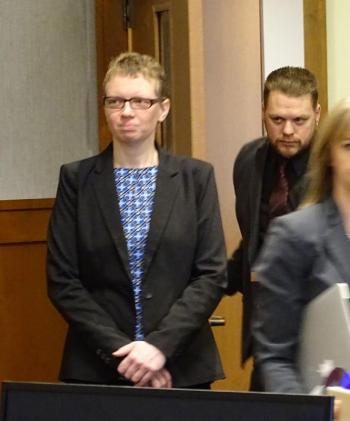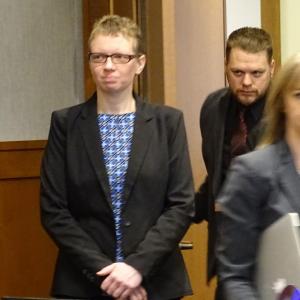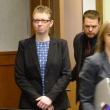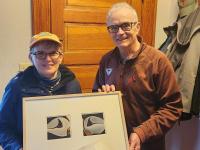DNA expert testifies ‘red-brown’ stains in home tested positive for blood
BELFAST — While the first half of the third day of Sharon Carillo’s trial focused on police interviews held the day 10-year-old Marissa Kennedy died, the afternoon focus was on procedure and handling of evidence.
Sharon Carrillo is currently on trial for depraved indifference murder after allegedly beating her 10-year-old daughter Marissa Kennedy to death over a period of months, ending with her Feb. 25 death.
Sharon’s then-husband, Julio Carrillo, was also charged with depraved indifference for his involvement in the beatings, which typically occurred more than once each day. According to interviews held with Sharon and Julio the day that Marissa died, the girl was forced to kneel with her arms above her head before being systematically beaten. This included being beaten on the sides with fists, karate chops, a belt, and a metal mop handle. Marissa’s cause of death is listed as battered child syndrome. Julio Carrillo pleaded guilty to depraved indifference murder in July and sentenced to 55 years in prison.
Over the course of the afternoon, Dec. 10, four witnesses from the Maine State Police Crime Laboratory took the stand to answer procedural questions about the ways evidence is taken, handled, turned in, and other procedures used in the collection of, and testing of the evidence collected by law enforcement.
Mackenzie Beyer, who works in evidence receiving in the state Crime Lab, was the first of the lab workers to testify, although there were more than 10 from the department listed in the state’s list of potential witnesses. Beyer briefly explained the procedure used when transferring evidence to the needed departments.
Maine State Police Forensic Scientist Diana Piccirillo, was also asked procedural questions about the way evidence in the Carrillo case, and in general, is handled.
Next, Thomas Gallagher works at the Office of the Chief Medical Examiner as the director of lab and mortuary operations. He testified that occasionally it falls on him to take a piece of evidence to the crime lab.
Kyra Bryant, a medical examiner assistant at the OCME, spoke about how on occasion the medical examiner's office will need to take evidence to the crime lab.
Forensic Chemist Michelle Fleury, who is with the MSP Crime Lab, was next on the stand, with Macomber asking her to describe her examinations, including where blood was found in the Carrillo home and on family’s clothing, and other items of interest, such as the belt used to beat Marissa.
Fleury talked about blood taken from the belt buckle allegedly used to beat Marissa. The buckle was reported to have small red-brown spatter, which later tested positive for blood.
Blood spatter, Fleury explained, is what happens when blood is moving through the air with some force before coming into contact with another object. Fleury said it is different than a transfer stain, which occurs when blood or fluid is transferred from one object to another.
Samples were taken from all over the Stockton Springs home the family shared prior to Marissa’s death and from any items suspected of holding DNA evidence, including blood spatter on the belt buckle, red-brown stains in the kitchen, bathroom, living room, parts of the head of the broken mop, and clothing worn by Marissa, Sharon, and Julio.
Defense Attorney Laura Shaw, who is one of two attorneys representing Sharon, cross-examined Fleury, asking her whether any blood was found on Sharon’s clothing. Fleury said there was not.
Forensic DNA analyst Cathy MacMillan was next on the stand, where she explained first what DNA is, and then how DNA testing is done. MacMillan is qualified to testify as a DNA expert.
MacMillan told jurors that the red-brown stains at the house largely tested positive for blood, with further testing revealing Marissa Kennedy as the major DNA donor in the samples, meaning she was responsible for most of the DNA recovered.
Some of the samples revealed at least two donors, but in every instance, Marissa was the major DNA contributor, but there was not enough material from the minor contributor to conduct DNA analysis, according to MacMillan.
Attorney Shaw cross-examined MacMillan, asking whether the samples that revealed two donors contained male and female DNA. According to MacMillan several of the swabs in question only tested positive for female DNA.
MacMillan testified that there is no way of knowing where the minor contribution came from, whether it was blood, skin cells, or something else.
One current and one former member of the MSP Computer Crimes Unit briefly testified.
Katie Dow is a current staff member of the MSP Computer Crimes Unit. Despite his departure from the unit, former staff member Dan Kilham was working on the CCU at the time of Marissa’s death and during the subsequent investigation. Both Dow and Kilham testified briefly about cell phones the unit had received and how they were handled.
The final witness called to the stand Tuesday was Maine State Police Sergeant Scott Quintero, who was working as a detective at the time of Marissa’s death. Quintero was one of the two MSP detectives who interviewed Sharon and Julio the day Marissa died.
Quintero also testified about the cell phone recovered from the Carrillo home, and those that were turned over by Camden Law after Sharon’s father submitted them to his daughter’s defense team.
The interactions between Julio and Sharon when the two were together, such as when the pair were being transported from the Stockton Springs town office where they were questioned, to the Hospitality House homeless shelter in Bangor, and then to the Maine State Police’s Bangor barracks, was also a topic discussed during his testimony.
Quintero said Sharon and Julio were friendly with one another in his presence. Quintero said that he never observed Julio whispering to Sharon Carrillo during the times he was with the couple. Sharon had told her defense attorneys that Julio had whispered to her to take 50 percent blame for Marissa’s death, according to affidavits filed by Sharon’s defense team prior to the trial.
The day was ended early to allow for Justice Robert Murray to meet with prosecutors and attorneys. It is scheduled to reconvene tomorrow at 9 a.m.
According to Assistant Attorney General Donald Macomber, the first witness for tomorrow is Chief Medical Examiner Dr. Flomenbaum, who conducted Marissa’s autopsy.
Erica Thoms can be reached at news@penbaypilot.com
Event Date
Address
United States

























